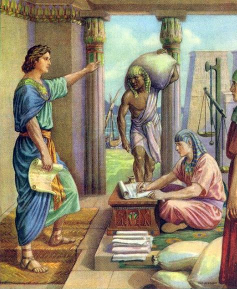The Education of Children
Helping children see the Lord in English and history
John 1:14. And the Word was made flesh, and dwelt in a tabernacle among us, and we observed His glory, the glory as of the only begotten of the Father, full of grace and truth.
EU 113. The reasons why the Lord was willing to be born on our earth, and not on another.
The principle reason was for the sake of the Word, in that it might be written on our earth; and when written be afterwards published throughout the whole earth; and when once published be preserved to all posterity; and that thus it might be made manifest, even to all in the other life, that God became Man.
EU 115. That the Word might be written on our earth, is because the art of writing has existed here from the most ancient time, first on the bark of trees, next on parchment, afterwards on paper, and lastly published by types. This was provided by the Lord for the sake of the Word.
EU 116. That the Word might afterwards be published throughout the whole earth, is because there is commerce here between all nations, both by land and water, to all parts of the globe. Hence the Word once written might be conveyed from one nation to another, and be taught everywhere.
DP 215:2. What dignities and riches are and where they come from. In the most ancient times dignities and riches were totally different from what they by successive stages have become in later times. In the most ancient times dignities were such as exist in the relationship between parents and children. They were dignities of love, full of respect and veneration, not because children received birth from their parents but because they received instruction and wisdom from them. This is a second birth, in itself spiritual, because it was the birth of their spirit. This was the only dignity in the most ancient times; for then tribes, families and households dwelt separately, and not under governments as at the present day. It was the head of the family in whom this dignity was vested. Those times were called by the men of old the Golden Age.
DP 215:3. After those times, however, there gradually crept in the love of ruling from the mere delight of that love. And because there arose at the same time enmity and hostility against those who would not submit to be ruled, from necessity tribes, families and households banded themselves together into communities, and set over themselves one whom they at first called judge, afterwards prince, and finally king and emperor. Then also they began to protect themselves by towers, earthworks and walls. From the judge, prince, king and emperor, as from the head into the body, the lust of dominion spread like a contagion among many. From this arose degrees of dignities, and also honors according to them; and with these the love of self and pride in one’s own prudence.
DP 215:4. The same thing happened in the case of the love of riches. In the most ancient times when tribes and families had dwelling places apart from one another there was no other love of riches than the desire to possess the necessities of life, which they procured for themselves by means of their flocks and herds, and their lands, fields and gardens from which they derived their living. Among their necessities of life were also beautiful houses, furnished with useful articles of every kind, and also clothing. Parents, children, men-servants and maid-servants, who formed the household, were engaged in the care and labor connected with all these things.
DP 215:5. Afterward … there crept in … the love of possessing wealth beyond their necessities; and it grew to such a pitch that it desired to possess the wealth of all others….
Questions and Comments
- What are some ways the teaching about why the Lord chose to be born on our earth can infill and affect our approach to the language arts?
- What is the most important thing that the Lord wants us to share with others, even with people from all over the universe? What is the most important use of language? Can this use govern other uses of language?
- Global commerce has been provided for the sake of making the Word available to everyone. Should we infer from this teaching any principles about globalization? Does it imply that it is important for us as a church to promote translation into other languages?
- What useful principles can we infer from DP 215 about early man and the development of civilizations? What does it teach us about our own civilization? Is it appropriate to look into the Sacred Scriptures and the Heavenly Doctrine to find guidance in the interpretation of history, archaeology, sociology, the sciences, and other disciplines? How do we avoid becoming too dogmatic so that we misread the data? How do we avoid being so enamored with human intelligence that we deny or ignore the teachings of the Word?
- Public education in the USA is not allowed to refer to God or the Word, for the most part—is this a fact? If so, is it fair to say that public education teaches a secular (non-religious), thus merely human and natural approach to life? Should this be one of the main reasons for seeking a New Church education for our children, whether at home or at KNCS?
| previous |  |
next |
|---|


